Hungary nationalists whip up anti-Roma feelings
- Published
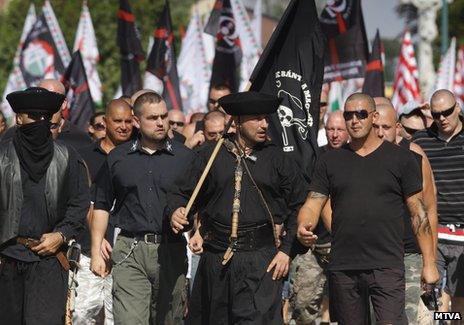
Police did not stop the anti-Roma extremists marching through Devecser
This summer has seen an escalation of tension in parts of Hungary where ethnic Magyars live next to Roma (Gypsies) - tension exploited by the extreme right-wing Jobbik party and its allies.
The authorities are not enforcing laws banning the incitement of hatred, leaving Roma to face abuse by paramilitaries linked to Jobbik, which won 16% of the vote in the 2010 election.
Jobbik won a local election in the northeastern town of Gyongyospata last year after neo-Nazi thugs invaded and terrified Roma residents. The party is now targeting areas outside its northeastern heartland.
Hungary has an estimated 800,000 Roma, in a population of 10 million.
According to Krisztian Szabados of Political Capital, a Budapest think-tank, the issue of anti-Roma feeling has been swept under the carpet by all governments elected since the transition to democracy. "Inter-racial relations are a ticking bomb that's going to explode in the foreseeable future," he said.
The western Hungarian village of Devecser is still recovering from the caustic red sludge that swamped it in 2010 - toxic waste from an aluminium plant. But on 5 August there was a different kind of flood - 1,000 neo-Nazi demonstrators linked to Jobbik, angry at the Roma.
"You are going to die here!" the marchers shouted, throwing their water bottles and stones at what they thought might be Roma homes.
Roma whose homes they passed were "really scared", said one Roma woman, Ibolya Domotor.
"This is the second disaster here and it is the worst of the two," said Alfred Kiraly, a Roma member of Better Chances After The Flood, a group set up to deal with the sludge aftermath. You could do something about the sludge, but not about the neo-Nazis, he said.
Inflammatory rhetoric
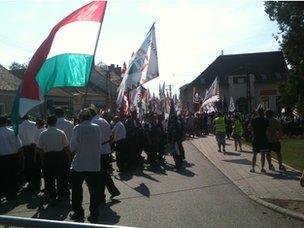
The marchers filled the narrow streets of Devecser
Gabor Ferenczi, a local Jobbik MP, said he wanted to see peace, order and safety in Devecser. This, he said, would be the reward for "normal" Hungarians who defended themselves against Roma. He urged villagers to call on the paramilitaries to help them.
The paramilitary marchers, mostly bussed in from outside, heard an impassioned speech by Laszlo Toroczkai of the far-right Sixty-four Counties group, who told them there were three options: "To emigrate, to become slaves of the Gypsies, or to fight."
"All the trash must be swept out of the country," said Attila Laszlo of the paramilitary For A Better Future Civil Guard.
And Zsolt Tyirityan of the Outlaw Army said "the Gypsy is genetically-coded for criminality".
A third of the village's 5,000 inhabitants are Roma. With no compensation for the fall in house prices since the sludge disaster few villagers can afford to move away.
"The mud did not discriminate between different races," says Kiraly. And the authorities were even-handed in rehousing those who lost their homes.
Roma and Magyar families have rubbed along as neighbours for decades, but the rehousing of a few Roma in mixed areas caused minor issues, he says.
Football racism
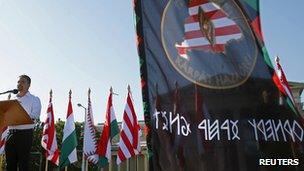
Jobbik held a big rally in central Budapest on 25 August
The ruling conservative Fidesz government of Viktor Orban, though no supporter of anti-Roma prejudice, has not issued a firm condemnation of the Devecser provocation - unlike its response to an anti-Semitic incident later in August.
Nationalist fans at a Hungary-Israel football match shouted "filthy Jews" and "Buchenwald" and whistled during the Israeli national anthem.
The Hungarian government said it "condemns in the strongest possible terms the insulting behaviour of certain Hungarian football fans".
Mayor Tamas Toldi, the local Fidesz representative in Devecser, said he was angered by the far-right speeches, but was unable to outlaw an event disguised as a "peace march". He said the 200 regular police assigned there could not stop it in mid-flow.
Near-silence at national level allows Fidesz "to avoid confronting right-wing voters sympathetic to Jobbik who they hope to keep in their camp," says Kristof Szombati of the LMP, a green party.
The far right has used local problems as a pretext to intimidate the Roma community. A recent instance was the rape and murder of a 25-year-old police psychologist, which resulted in an anti-Roma march in Pecs in late July, albeit a peaceful one.
The trigger for the Devecser march was a convoluted dispute between two long-term neighbours. Their bickering escalated into two brawls.
Later, posts appeared on a far-right website calling for readers to rally to the aid of their compatriots after "hundreds of Gypsies attacked a handful of Magyars". And rally they did.
The lawyer for the Magyar family warns of a "civil war" if Roma do not conform to the wishes of the majority.
Mayor Toldi talks proudly of welfare-for-work schemes which keep unemployed Roma occupied. He also hopes village forums can agree informal rules to resolve neighbourhood problems.
Consensus may yet prove more attractive than calling on the services of paramilitaries.
- Published4 June 2024
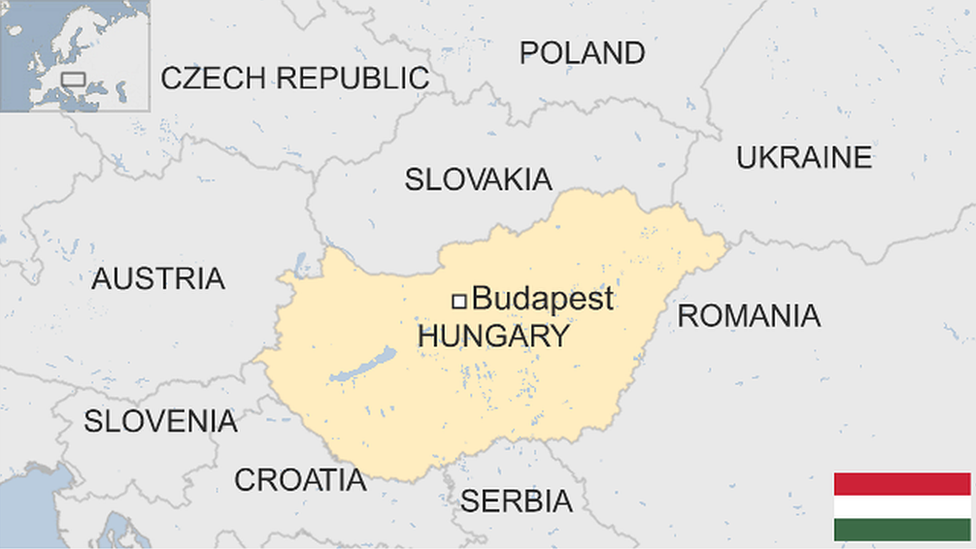
- Published8 June 2011
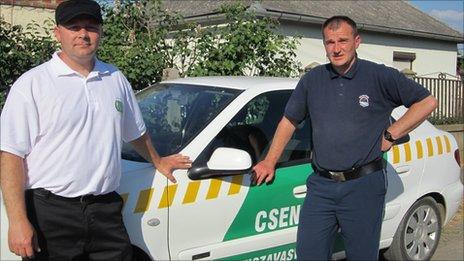
- Published24 December 2010
- Published1 February 2011